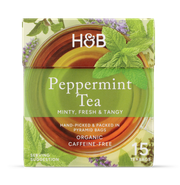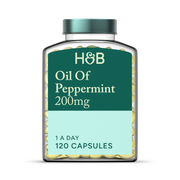15% off £25 or 20% off £35
Code:BASKET
From oil to tea: why peppermint’s a refreshing all-rounder

From fending off spiders to keeping your breath fresh, this minty multitasker is trending. Discover why peppermint oil, capsules and teas are so popular – and how to enjoy them safely
Our top picks
Organic and caffeine-free

Holland & Barrett
Holland & Barrett Perfect Peppermint Tea 15 Tea Bags
£3.49
200mg capsules

Holland & Barrett
Holland & Barrett Oil of Peppermint 120 Capsules
Save up to 1/2 Price
£7.79
£12.99
You’ve probably caught a whiff of peppermint without even realising it – whether in toothpaste, chewing gum or your favourite post-dinner herbal tea. But beyond the fresh flavour, peppermint leaves and their oil have been used for centuries.1
Curious about peppermint oil? Wondering if it could really prevent those pesky spiders making your home its own? Discover its top benefits, how to use it safely, the right dose and what to watch out for – all in one refreshing guide.
What’s peppermint?
Native to Europe and North America, this herb has long been a staple in traditional wellness routines. It’s cool, minty feel comes from menthol, which gives the oil its signature scent and sensation.1-2
So, what’s peppermint oil?
Peppermint oil is made by steam-distilling the leaves and flowers of the peppermint plant – a natural hybrid of water mint and spearmint.3. There’s a reason peppermint oil pops up in so many products – it’s versatile, refreshing and easy to use. You’ll find it in everything from tablets and capsules to essential oils and teas – even some shampoos, insect repellents and foot creams.
You can:
- dilute it with a carrier oil (like jojoba or almond)
- pop a few drops into a diffuser and breathe in the scent
- dilute in 20ml carrier oil and add it to a warm bath for a relaxing soak
- make a homemade spider repellent with 10 drops of peppermint oil to one cup of water and use in a spray bottle on corners, doors and windows
If you're looking for something more targeted, peppermint oil capsules are a popular choice. More on this here.
*Pure essential oils should never be applied directly and undiluted to the scalp/skin or bath as it can lead to irritation, burns and skin damage. Please dilute properly, read warnings and follow instructions provided on the product label carefully before use.
What about peppermint tea?
If you’re after a gentler way to enjoy peppermint, a warm cup of peppermint tea could be just the thing. Naturally caffeine-free, it’s been sipped for centuries to round off a meal with a refreshing twist. Plus, it’s a cosy and soothing option for any time of day – especially after dinner.2
What about peppermint oil capsules?
Peppermint oil capsules are a popular and effective choice for supporting digestive health, especially when they come with an enteric coating, which helps ensure the peppermint oil is released in the intestines – right where it’s needed most.4
Remember to:
- take with water (don’t chew or open them)
- aim for 30 to 60 minutes before meals5
- stick to the dose on the label
When’s the best time to take peppermint oil capsules?
To get the most from peppermint oil capsules, take them 30 to 60 minutes before meals or snacks, with a glass of water – and be sure to swallow them whole. For best results, leave a two-hour gap if you're also using indigestion remedies, so the capsules can do their job properly.5
Any side effects of peppermint?
Peppermint and peppermint oil are generally safe for adults when used correctly, but there are a few things to keep in mind:
- don’t use if you're pregnant, breastfeeding or giving it to a child under four6
- side effects may include heartburn, skin irritation or allergic reaction7
- start slow – especially when ingesting
If anything feels off, stop using it and speak with your GP.
How to make your own peppermint oil
Fancy a DIY moment? Making peppermint oil at home is surprisingly simple.
All you need is:
- fresh peppermint leaves
- a carrier oil (like grapeseed or coconut)
- a glass jar, cheesecloth and a bit of patience
Lightly crush the leaves, cover them in oil and leave the jar sealed for a few days. Strain and repeat to build intensity. You can keep going until the scent is just right.
The final say
Peppermint does a lot more than smell good. Whether you try peppermint oil capsules or sip it in tea, this refreshing all-rounder deserves a spot in your lifestyle routine. You can enjoy it your way – pop a capsule before meals, brew a soothing cup or add a few drops of oil to your bath or diffuser.
And if you’re feeling inspired, why not explore other essential oils to see what they can do for your mind, body and everyday wellbeing?
The advice in this article is for information only and should not replace medical care. Please check with your GP or healthcare professional before trying any supplements, treatments or remedies. Food supplements must not be used as a substitute for a varied and balanced diet and a healthy lifestyle.
1. Grigoleit HG, Grigoleit P. Gastrointestinal clinical pharmacology of peppermint oil. Phytomedicine. 2005;12(8):607–11. Available from: https://pubmed.ncbi.nlm.nih.gov/21144345/
2. McKay DL, Blumberg JB. A review of the bioactivity and potential health benefits of peppermint tea (Mentha piperita L.). Phytother Res. 2006;20(8):619–33.
3. European Medicines Agency. Assessment Report on Mentha x piperita L., folium [Internet]. London: EMA; 2011 [cited 2025 Jul 24]. Available from: https://www.ema.europa.eu/en/documents/herbal-report/superseded-assessment-report-mentha-x-piperita-l-folium_en.pdf
4. Liu JH, Chen GH, Yeh HZ, Huang CK, Poon SK. Enteric-coated peppermint-oil capsules in the treatment of irritable bowel syndrome: a prospective, randomized trial. J Gastroenterol. 1997;32(6):765–8. Available from: https://pubmed.ncbi.nlm.nih.gov/9430014/
5. NHS. Peppermint oil: how and when to take it [Internet]. NHS.uk; [cited 2025 Jul 24]. Available from: https://www.nhs.uk/medicines/peppermint-oil/how-and-when-to-take-peppermint-oil/
6. National Center for Complementary and Integrative Health. Peppermint Oil [Internet]. Bethesda (MD): NCCIH; [cited 2025 Jul 24]. Available from: https://www.nccih.nih.gov/health/peppermint-oil
7. American Academy of Family Physicians. Treatment Options for IBS [Internet]. AAFP; 2007 [cited 2025 Jul 24]. Available from: https://www.aafp.org/afp/2007/0401/p1027.html
8. Gladstar R. Herbal Recipes for Vibrant Health. North Adams (MA): Storey Publishing; 2001. How to make peppermint oil; p. 145–6.
















